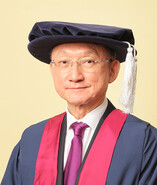
名譽大學院士

鍾棋偉先生於1976年加入其家族企業華厦置業集團出任董事,並於2000年成為主席。華厦置業作為一家投資控股公司,致力投資、發展及管理多項香港物業。在過去40多年,鍾先生一直帶領公司迎接本港不斷變化的地產面貌,管理及監管集團的地產項目。
鍾先生秉承其父親樂善美德,一脈相傳,其對慈善事業的跨代貢獻備受推崇。鍾氏家族在本地及內地積極支持慈善福利工作,大力捐助教育機構及醫療基建發展。
鍾先生是香港大學基金榮譽會長,他帶領鍾家在香港大學成立了三個明德教授席,包括2012年成立鍾棋偉龔素霞基金教授席 (創新及微創外科)及鍾江海基金教授席(腸胃外科);以及2005年成立秦蘭鳳基金教授席(肝膽胰外科)以敬慈親。鍾先生信賴醫學研究亦促成學院取得卓著成就。
鍾先生亦是一位藝術收藏家,是著名團體「敏求精舍」的會員。敏求精舍於1960年由一羣醉心於收藏中國文物藝術品的上海及香港華人收藏家所成立,鍾先生在過去四年亦擔任該會副會長。鍾先生尤甚鍾愛明清兩代的官窯珍瓷,有聞名的懷海堂藏品,並經常慷慨捐贈予本地大學及公共藝術博物館,公諸同好並分享鑑賞心得。
Citation written and delivered by Professor Gabriel M Leung, Dean of Medicine
The story of the Cheung family is at once typical of the times and remarkable for its prescience of what may yet come. It began in Anxi county of Fujian province (福建省安溪縣官橋鎮善壇村). At its head was Cheong Eak Chong (鍾奕莊), also known as Zhong Mingxuan (鍾銘選), who was born a few months after our medical school admitted the first cohort of students. This patriarch became part of the Fujian diaspora in Southeast Asia and learned his trade as a goldsmith in Singapore. War and revolution brought the fledgling family business first to Shanghai then Hong Kong, in addition to establishing a firm base in the Lion City. Through his 28 children, 90 grandchildren and many many more great-grandchildren and great-great-grandchildren, their various businesses in real estate, property development and tourism have flourished.
Our honorand, Anthony CHEUNG Kee Wee (鍾棋偉), a third-generation descendant, is the first-born son of Cheung Kung Hai (鍾江海) and Chin Lan Hong (秦蘭鳳), where Kung Hai (江海) himself was the first-born of the family patriarch. Those who may be familiar with the medical campus will immediately recall being welcomed into the Cheung Chin Lan Hong (鍾秦蘭鳳) Atrium or 蘭庭at our main entrance that in turn leads to the Cheung Kung Hai Conference Centre (鍾江海會議中心). The four lecture theatres that comprise the Conference Centre have served as the primary teaching venue for a whole generation of medical students, amongst whom is the first-born son of our honorand, Jason (鍾培言). Not only was he our medical graduate, he is in fact our incoming Head of Orthopaedics and Traumatology.
Of course, these eponymous tributes to his parents are not only symptomatic, but pathognomonic, of Anthony’s noblesse oblige, that is very much part of his family legacy. In as early as 1984, his grandfather was lauded by the Fujian provincial government with the accolade “樂育英才” for having endowed primary and secondary schools in his home county and village. Our honorand extended this education legacy by establishing three endowed professorships in HKUMed’s Department of Surgery. His own father was similarly honoured by Fujian with a ceremonial plaque bearing the apothegm “興醫利民”. To this day, Mingxuan Hospital (銘選醫院), the flagship home county hospital so named in the patriarch’s honour, stands as proud testatment to the family legacy.
Anthony’s philanthropy goes broadly, and elegantly, beyond the more familiar arenas of health and education, to include Chi Lin Monastery and above all his lifelong passion of heritage preservation through collecting and donating art objects and artefacts. He is an acknowledged authority on Ming and Qing porcelain ceramics through the Huaihaitang (懷海堂) Collection. In particular, over decades he had painstakingly assembled and recently exhibited a very rare collection of Qing state ritual vessels. To mark the 500th anniversary of Ming Emperor Jiajing’s (嘉靖) coronation next year, Anthony will showcase a cognate series of art pieces at the Hong Kong Museum of Art. The following year will see a major exhibition featuring works from the Qianlong (乾隆) era at the Chinese University of Hong Kong Institute of Chinese Studies Art Museum. Both museums already house several substantial collections our honorand has donated over the years.
In this coming age of the “third redistribution” recently heralded by President Xi Jinping, it is particularly fitting that we honour Anthony for having most excellently carried on the family philanthropic legacy. The lived diasporic experience of the Cheungs, along the Maritime Silk Road that is once again a main focus of our country’s renaissance, is a timely reminder of how we can prosper by deeply engaging with our regional neighbours. For his quiet works of charity and his steadfast belief in preserving heritage for posterity, it remains my honour, Mr Pro-Chancellor, to present Mr Anthony CHEUNG Kee Wee (鍾棋偉) for the Honorary University Fellowship.
